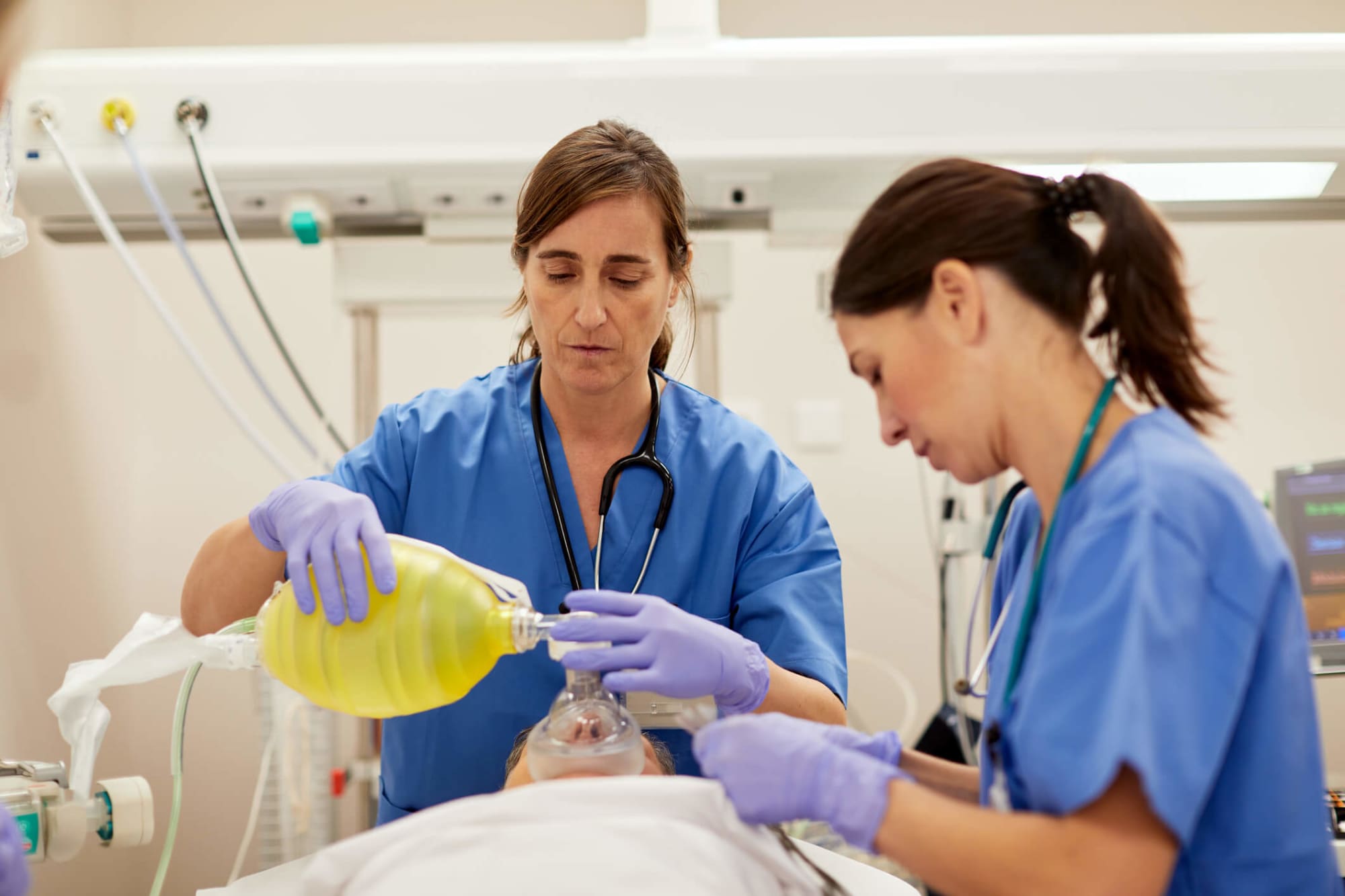Trauma Nurse Career Overview

Trauma Nurse Career in Brief
Trauma nurses stand on the front lines of emergency care, serving as first responders to critically injured patients. They work closely with emergency department physicians, trauma surgeons, and transport teams to stabilize patients and save lives.
Primary Responsibilities
- Deliver emergency medical care as needed
- Triage patients to prioritize the most severe and/or life-threatening injuries
- Assist in running codes (such as advanced life support)
- Administer medications and intravenous fluids
- Provide wound care
- Maintain communication among doctors, other healthcare professionals, and families and/or law enforcement
- Distribute resources and arrange access to services as needed
Key Skills
- General nursing knowledge
- Decision-making
- Multitasking
- Communication
- Maintaining a calm demeanor during busy and constantly evolving situations

Tempura / E+ / Getty Images
Where Do Trauma Nurses Work?
Most trauma nurses work in emergency departments or emergency rooms (ERs), intensive care, or trauma units within hospitals. Some work in specific critical care divisions, such as cardiac, medical/surgical, and burn units. They might also be a part of a paramedic or emergency response team, including air and surface transport.
Emergency Departments
Trauma nurses in emergency departments work within a team of first responders when patients arrive with critical injuries or illnesses. They assist with diagnosis and treatment, including providing CPR and basic life support, assist physicians and surgeons, and communicate with patients and families. They also triage individuals to prioritize care when multiple patients arrive simultaneously.
U.S. Air Force
Trauma nurses in the U.S. Air Force care for critically injured patients in active military settings. They may provide treatment to save a person’s limbs, stabilize and resuscitate patients, and make medical decisions that allow patients to return home after severe injury or illness.
Trauma Centers
Trauma centers are a part of a hospital’s emergency department typically reserved for the most life-threatening injuries, such as car accidents, severe burns, or gunshot wounds. Unlike an emergency room, which is equipped to handle cardiac and respiratory events, trauma centers are reserved for traumatic injuries.
Why Become a Trauma Nurse?
Trauma nurses who thrive in this position can remain calm in high-stress situations and are prepared on the front lines of intense healthcare emergencies. If you think you may wish to pursue this career, consider the following advantages and disadvantages to becoming a trauma nurse.
Advantages to Becoming a Trauma Nurse
Providing vital, life-saving care to patients who need it the most
Fast-paced, challenging work environment
Higher-than-average pay
Varied work settings, including hospitals and the military
Disadvantages to Becoming a Trauma Nurse
Work environment can be chaotic and stressful
Emotionally challenging at times
Higher burnout rate due to the high-stress environment and treating traumatic injuries
How to Become a Trauma Nurse
Certification Options for Trauma Nurses
Trauma Certified Registered Nurse
Issued by the Board of Certification for Emergency Nursing (BCEN), TCRN is an exam-based credential for licensed nurses with at least two years of experience. Certified individuals demonstrate the skills and knowledge required to offer quality patient care.Basic Life Support Certification
The American Red Cross offers this credential for candidates who complete training courses in CPR and basic cardiovascular life support skills.Advanced Life Support Certification
Trauma nurses who provide care during cardiac emergencies can earn this Red Cross certification indicating their skills in cardiac and respiratory arrest management.Trauma Nursing Core Course Certification
This continuing education course grants a four-year TNCC provider designation. The course improves trauma nursing care skills through hands-on study in the latest practice recommendations, injury identification and assessment, and care applications.Emergency Nursing Pediatric Course Certification
A continuing education program that leads to a four-year certification as an ENPC provider, the course explores pediatric emergency nurses practices. Lectures emphasize issues related to child emergencies, such as food allergies and human trafficking.
How Much Do Trauma Nurses Make?
Trauma nurses earn slightly more than other RNs. According to PayScale, a TNCC nurse earns an average salary of $83,260.
In general, earning certifications can increase pay significantly. A 2017 BCEN survey revealed that nurses with the certified emergency nurse credential earn roughly $1,400 more per year than those without the designation. These nurses also report higher levels of confidence in their work and satisfaction with their career achievements.
Overall, demand for RNs is strong, including a wealth of job opportunities for trauma nurses. An aging U.S. population with increasingly complex medical needs drives a growing demand for healthcare services and emergency needs.
U.S. Bureau of Labor Statistics projections (BLS) indicate that employment levels for nurses should increase by 7% from 2019-29, which is faster than average for all occupations combined.
Frequently Asked Questions
How much schooling do you need to be an ER nurse?
Prospective trauma nurses must earn an RN license after completing a diploma, associate-, or bachelor’s-level program that prepares candidates to take the NCLEX-RN exam. Trauma nurses should also be certified in basic life support, advanced cardiac life support, and pediatric life support. Most employers, however, require trauma nurses to be TCRNs. This credential requires two years of experience, an additional 20-30 hours of classroom training, and passing an exam.
How much does a trauma nurse make in a year?
The BLS reports a median annual wage of $75,330 for nurses. According to PayScale, the average salary of a trauma nurse is $83,260. Becoming certified can increase compensation.
Can trauma nurses intubate?
It depends. In every state, nurses are guided by a scope of practice that dictates their practices and duties. Some states allow trauma nurses to intubate patients if they have received the appropriate training and/or the hospital or facility maintains a written policy relating to intubation. In some cases, intubation is an expected skill. The Air and Surface Transport Nurses Association considers intubation a standard of practice in that field.
What is a trauma nurse’s role?
Trauma nurses provide triage, diagnosis, and care for patients with critical injuries and illnesses. They provide immediate emergency care including CPR and first aid, prepare patients for surgical procedures, and assist in emergency surgical procedures. They also serve as liaisons between physicians and families and, when needed, law enforcement.
Resources for Trauma Nurses
Society of Trauma Nurses
STN is an international professional organization dedicated to ensuring the best quality trauma care for all. They accomplish this through education, certification, mentorship programs, and fostering collaboration with other healthcare disciplines. Membership is open to both RNs and nursing students and includes opportunities for professional development, networking, and discounts. STN also offers a career center with an active job board.Emergency Nurses Association
ENA is dedicated to advancing excellence in the field of emergency nursing. The organization issues clinical practice guidelines and provides continuing education courses to help improve patient outcomes and advance nurse careers. The association hosts an annual conference, publishes the Journal of Emergency Nursing, and provides extensive networking opportunities and discounts.American Trauma Society
Open to both individuals and organizations, the American Trauma Society provides resources and professional development activities for healthcare professionals who want to further their careers in emergency medicine and trauma response. Members enjoy access to networking resources and an exclusive job board.
Related Pages
Reviewed by:

Elizabeth Clarke (Poon) is a board-certified family nurse practitioner who provides primary and urgent care to pediatric populations. She earned a BSN and MSN from the University of Miami.
Clarke is a paid member of our Healthcare Review Partner Network. Learn more about our review partners.








